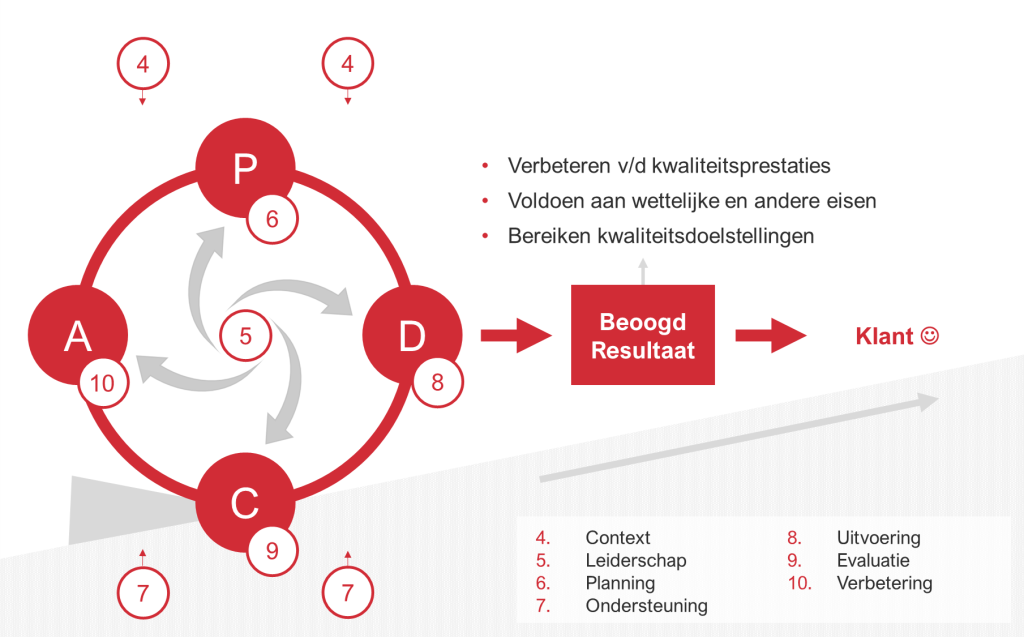ISO 9001:2015
ISO 9001:2015
Every organisation strives to offer quality products and/or services and respond optimally to its customers' expectations. ISO 9001:2015 is an internationally recognised standard that sets requirements for an organisation's quality management system.
What is ISO 9001
A Quality Management System (QMS) is a management tool for improving the quality of operations in a systematic, transparent and effective manner. In other words, it is a defined way of directing and controlling an organisation with regard to quality. ISO 9001 is an internationally recognised standard in the field of quality management and contains various requirements that a quality management system must meet.
The focus of ISO 9001 is on the 7 quality principles:
- Customer focus
- Leadership
- Commitment
- Process approach
- Evidence-based decision-making
- Relationship management
- Continuous improvement
For this, ISO 9001 lays down standard requirements to secure and improve the processes that are important for increasing customer satisfaction (and thus quality) (~ continuous improvement).
If you meet the requirements of the ISO 9001 standard, you can be certified by an accredited certification body (CB).By obtaining this ISO 9001 certificate, you demonstrate that continuous improvement is integrated into the organisation's operations.
ISO 9001:2015
The first version of the ISO 9001 standard for quality management dates back to 15 March 1987. That standards document - as is the case with other management standards - was revised regularly over the years by an expert committee. The committee can decide to revise or withdraw from the standard.
In the end of 2015, the latest version of the ISO 9001 standard was released, officially named NBN EN ISO 9001:2015 in Belgium.Here, 'NBN' refers to the Bureau for Standardisation, a Belgian government body responsible for making standards available in Belgium. The 'EN' suffix in turn refers to the European publication by CEN-CENELEC.
Why ISO 9001 certification?
ISO 9001 is the standard of choice for quality management, with over a million valid certificates worldwide. With an ISO 9001 certificate, you demonstrate to the outside world that you are continuously committed to continuous improvement, process optimisation and customer satisfaction.
Customer satisfaction is the focus of ISO 9001. By taking this into account in all your business processes, you lay the foundation for satisfied and loyal customers because you continuously monitor and respond to their expectations.
Certification inspires confidence. With ISO 9001, you can demonstrate that you have a well-functioning KMS according to an independent party. You give customers the assurance that you can deliver products and services that meet their requirements and comply with relevant laws and regulations.
There are no legal requirements that oblige you to certify business processes in terms of quality management. Yet customers and other partners (including in tenders) often value an ISO 9001 certificate!
ISO 9001 focuses on improving processes - in which quality is central.
The content of ISO 9001
ISO 9001 - like most ISO standards - is drafted according to the Harmonised Structure (HS) principal.This means that these standards have a common core text and the same structure. This ensures that topics covered in each standard are always addressed in the same place (chapter & paragraph).
The standard consists of 11 chapters, which are shown below. The first four chapters (0 to 3) contain general explanations, while chapters 4 to 10 describe the core of the standard, i.e. the standard requirements.
| Chapter 0: Introduction | Chapter 6: Planning |
| Chapter 1: Scope | Chapter 7: Support |
| Chapter 2: Normative references | Chapter 8: Implementation |
| Chapter 3: Definitions | Chapter 9: Evaluation |
| Chapter 4: Context of the organisation | Chapter 10: Improvement |
| Chapter 5: Leadership |

Who is ISO 9001 intended for?
Any organisation can obtain ISO 9001 certification, regardless of its size or sector: from a small bakery with 2 employees to internationals with multiple branches. The reason for this is simple: ISO 9001 is not about a sector, but about how an organisation is set up to meet its customers' expectations.
In addition to ISO 9001:2015, there are several sector-related extensions to the standard. Consider, for example, AS 9100 for aviation.
The ISO 9000 series
The ISO 9001 standard is one of the documents in the ISO 9000 series. It consists of the following standards and guidelines:
- ISO 9000 'Quality management systems - Basic principles and glossary'
- ISO 9001 'Quality management systems - Requirements'.
- ISO 9004 'Quality management systems - Guidelines for performance improvements'.
- ISO 19011 'Guidelines for conducting audits of management systems'
From the above documents, you can only get certified for the ISO 9001 standard. The other documents are informative and contain guidelines, terms and definitions, ...